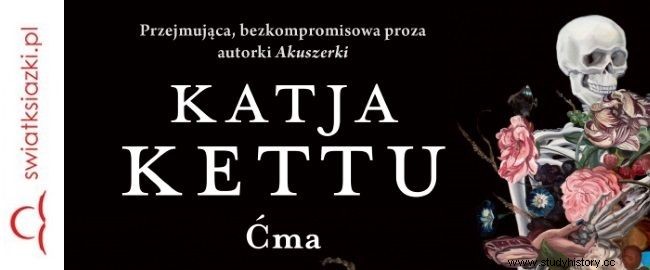During the Cold War, the norm was the mass flight of people from the Eastern Bloc to capitalist countries. The embarrassed desperates confirmed the advantage of the West over the East. But there were also those who abandoned the capitalist paradise for the homeland of the world proletariat. What drove them?
In the Soviet Union, as the propaganda song says, man allegedly "breathed slowly". Contrary to these words, the inhabitants of the Eastern Bloc chose massively ... a different type of breath. Migration statistics "from" and "to" leave no doubts in this matter. Hundreds of thousands decided to leave the communist paradise. Single units were coming to him.
What could have led those who, in spite of widespread migration, chose to escape against the tide? One possible answer is suggested by the Finnish novelist Katja Kettu in her book "Moth":
Apparently there, for abroad (in the Soviet Union - author's note), was made fun of substitute coffee, a hips women wrapped rollers fat, rolls baked with silky wheat, a collective farm cow with full udders roared: Come and milk me! Someone escaped on a boat to Ruskies and from right away appointed go commissioner na terrain Murmańska.
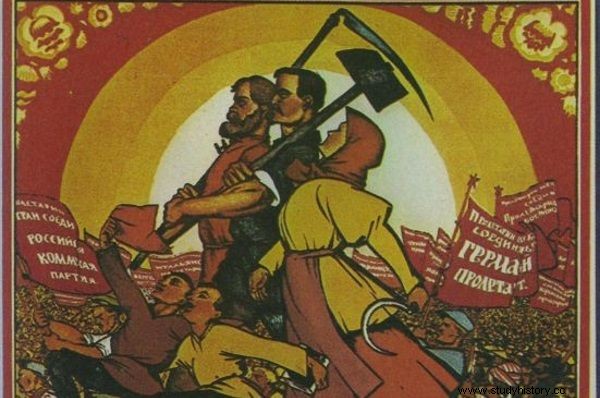
Soviet propaganda took care to present the Soviet Union as a country flowing with milk and honey. Who believed it enough to move there? The illustration shows a fragment of a May Day poster from 1920 (source:public domain).
The Promised Land of Exposed Spies
Almost all the escapes from capitalist countries to the Soviet Union were influenced by the long-lasting work of the extremely effective Soviet intelligence. Mostly, they were escaping… exposed spies.
The adjectives "ant" and "perennial" are used here on purpose. Very often left-wing associations emerging at universities were under surveillance and infiltrated. The circles of students of elite universities were the most promising from the point of view of the Soviet Union. It was known that their representatives would perform responsible functions in the state administration in the future.
An example of the success of Soviet intelligence is the career of one of the most famous spies of all time - Kim Philby. He made friends with communism while still studying at the University of Cambridge. However, he hid his sympathies and for a long time built the legend of an ardent anti-communist, including as a correspondent for the Times daily. He was so convincing in this that during the Second World War he was hired by British intelligence . This allowed him to serve the Soviet Union as a double agent.
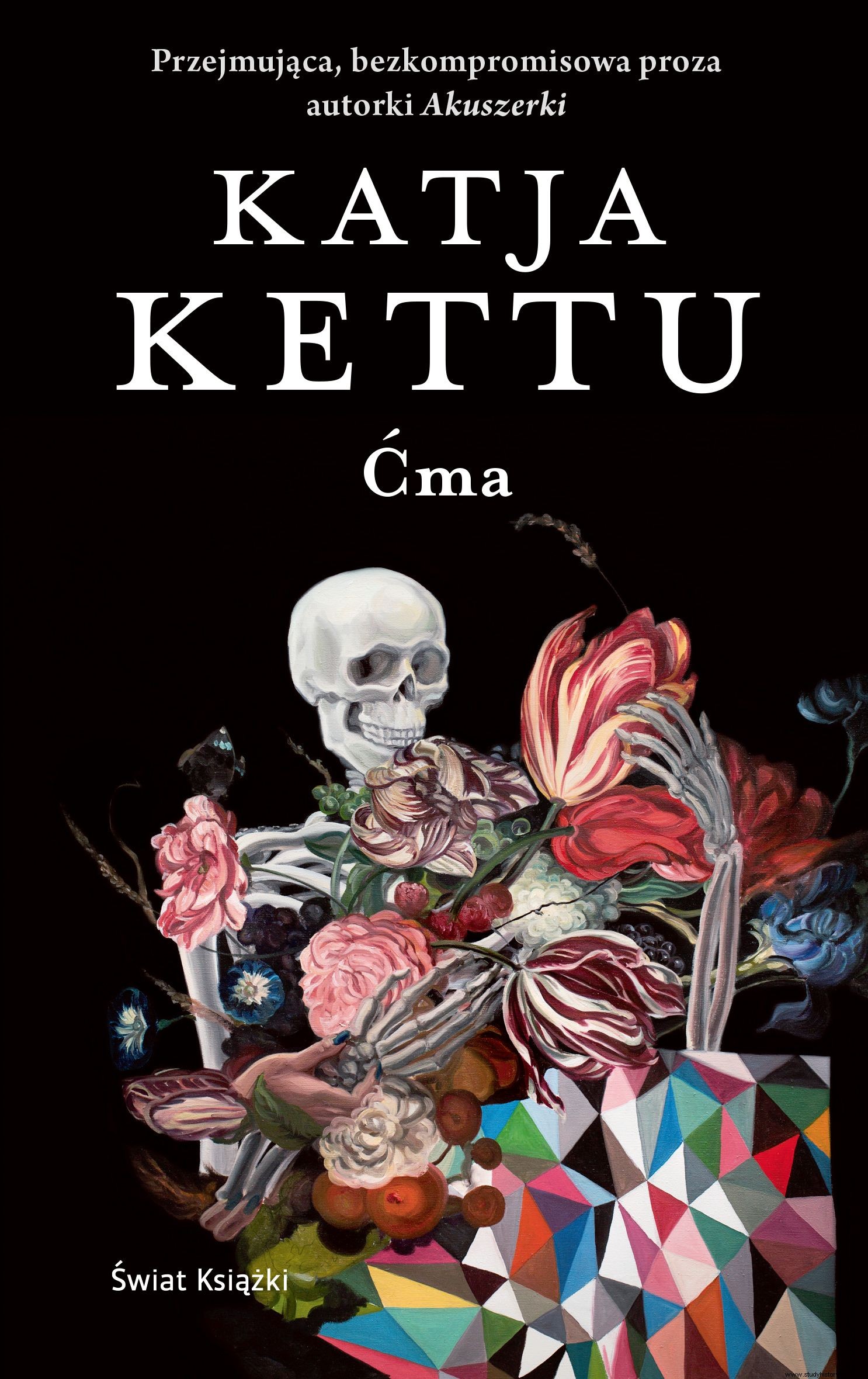
The article was based, among others, on the book by Katja Kettu "Ćma", which has just been published by the Świat Książki publishing house.
It was not completely exposed until 1963. Philby was then working in a British intelligence facility in the capital of Lebanon. He had to quickly run away. He managed, with the help of KGB agents, to flee Beirut aboard a Soviet-flagged ship. And so he came to his new homeland - the Soviet Union. In Odessa, where he went ashore, he was received with honors worthy of a national hero.
The longtime double agent was not the only spy recruited from Cambridge. Soviet intelligence managed to get as many as five associates there (the so-called "five from Cambridge"). Two of them, Donald MacLean and Guy Burgess, ended up in the USSR many years before Philby. For fear of being exposed, they sought refuge there as early as 1951. The three of them spent the rest of their lives in Moscow, fully believing in the ideals of communism.
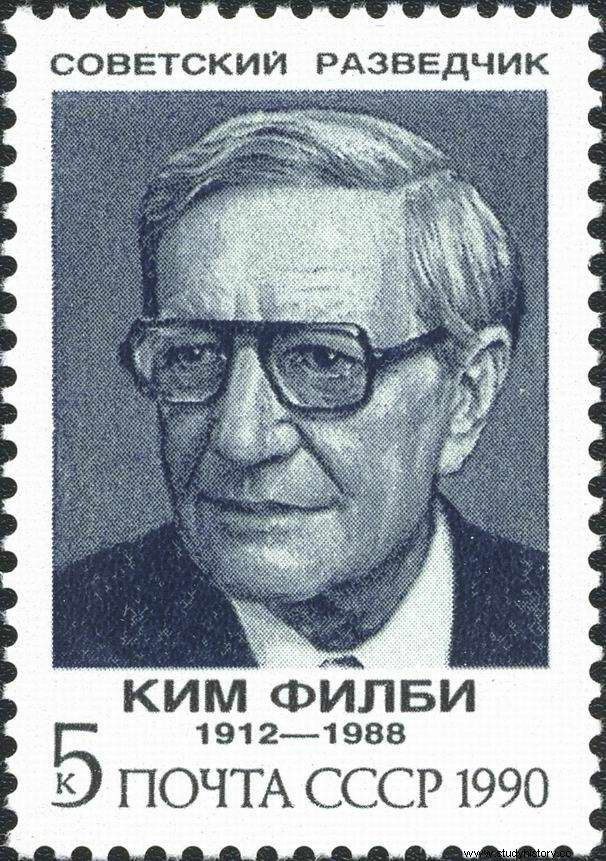
Kim Philby acted as a double agent for many years. He fled to the USSR when his cooperation with Soviet intelligence was revealed. In the USSR, he was greeted like a hero. His image even appeared on stamps (source:public domain).
The other two members of the five, Anthony Blunt and John Cairncross, were less fortunate. After being denounced, they were publicly stigmatized by British authorities. The reasons for the British fascination with the Soviet Union can be found in Blunt's declassified memories after a quarter of a century. He emphasizes that came to the Soviet side under the influence of his sexual partner at the time. It was Burgess. But he also writes about other factors that "made" his conversion easier:
There was a special atmosphere in Cambridge, and the enthusiasm for all anti-fascist activities grew so intense that they made me make the biggest mistake of my life.
Scientists - a tasty morsel
Members of the Cambridge espionage network were welcomed into the Soviet Union with open arms. A similarly welcoming reception was made to exposed agents from the United States. Soviet intelligence, of course, did not abandon its activities in the territory of its greatest enemy. Outstanding scientists were a tasty morsel for the communist recruiters especially those working on government programs.
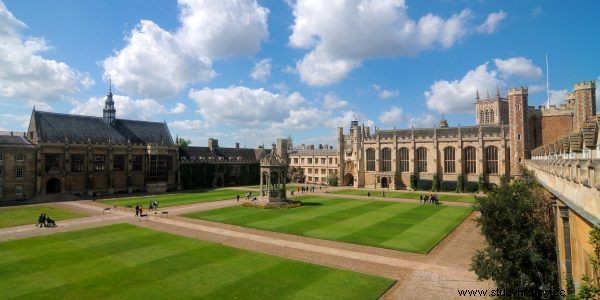
The most dangerous spy network in Great Britain was recruited by the Soviets ... from among students at the University of Cambridge. The photo shows Trinity College, where Kim Philby, one of the members of the "Cambridge Five", studied (photo Cmglee, license CC BY-SA 3.0).
The greatest success of the USSR agents was the recruitment of engineers Alfred Sarant and Joel Barr working for the American army. They became the main figures in the Rosenberg espionage network. This is how Stanisław Gregorowicz describes their achievements in the text "American heroes of the Soviet Union":
In the 1940s, the Russians stole - through Julius Rosenberg and his contacts with Joel Barr and Alfred Sarant - the first designs of a radar and proximity fuse for anti-aircraft missiles. This network was particularly active in the years 1942-1946, when the Americans were working on the atomic bomb as part of the "Manhattan Project".
After the Rosenbergs' mishap, both scientists fled to the Soviet Union. There, in the midst of communist heroes, they continued to work. But for a new motherland.
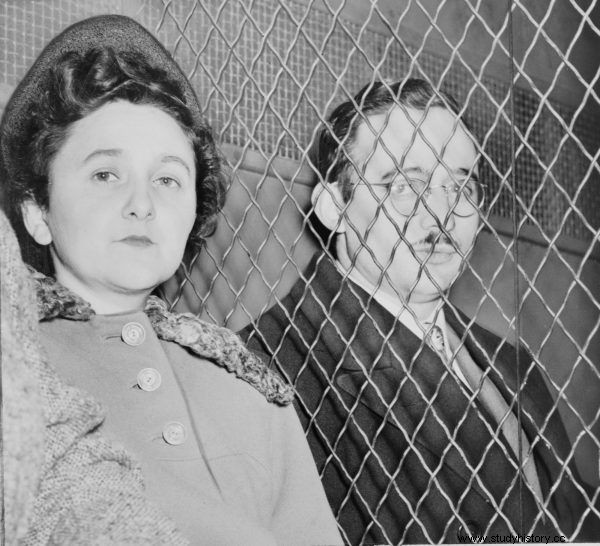
Soviet intelligence was interested in US nuclear research. Information on this subject was obtained through a spy network headed by Ethel and Julis Rosenberg (photo). After the mishap, they were sentenced to death, but some of their associates managed to escape (source:public domain).
Better for the naive
Vigorous Soviet propaganda found fertile ground, especially in the case of young people. The vision of social justice convinced not only those who rebelled against the reality that surrounded them, but often also simply weak and naive individuals. Such - young and emotionally unstable - was certainly the heroine of Katja Kettu's book "Moth". This is how he describes his escape from Finland to the USSR:
No I turn out. With nostrils lifts me myself couple, narrow skis shine, a w in the mouth I feel taste metal. The breast warms me brought by breeding Skolts reindeer square tab from Wilczy Tooth. Wrote na her: "Miłaja Irgochko, prijezdżajtie here build better the world. I'll arrange passport and pass ”. I think about inkjet squiggles and hard, bony hands, which this wrote. Coming soon te slimmer fingers me will cover.
Its history, however, shows that the Soviet Union pampered and nurtured only the most useful immigrants. The naive heroine of "Moths" managed to get to the longed-for "paradise", but there was no bright future waiting for her. She ended up in the gulag in Vorkuta.

The article was based, among others, on the book by Katja Kettu "Ćma", which has just been published by the Świat Książki publishing house.
Lee Harvey Oswald experienced a similar disappointment. This American adventurer and rebel, showing obvious emotional disturbances, confessed to his fascination with Marxism. He fled to the Soviet Union, and ostentatiously handed over his American passport there. However, the Soviets had no use for it. Soon he was transferred to Minsk, where he worked in an electronic equipment factory. However, life in the capital of the Byelorussian SSR quickly got bored with him. He returned to his homeland ... and went down in history as the killer of President Kennedy.
The hideout of the persecuted… and the dream of artists
Although it may seem like a paradox, there were also escapes to the USSR due to political persecution. However, these were rare cases. An example is the Turkish writer Nazim Hikmet Ran, a member of the Communist Party of Turkey. This descendant of a Polish emigrant spent almost twelve years in a Turkish prison because of his anti-state activities and communist views.
After his release, Nazim expected another arrest. To avoid him, he fled to the homeland of world communism. He accepted Polish citizenship. He added his grandfather's surname - Borzęcki to the part of Ran. Already living in the Soviet Union, he gained worldwide fame and the opinion of one of the most important Turkish writers of the twentieth century.
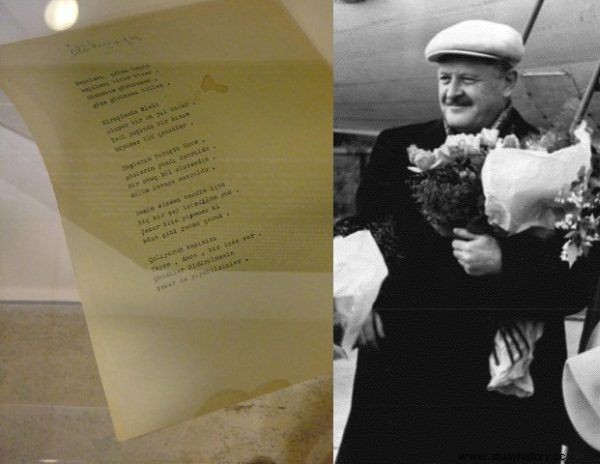
Nazim Hikmet Ran moved to the USSR to avoid political persecution (photo:Horst Sturm, license CC BY-SA 3.0 de). He was one of the most famous Turkish writers outside his own country - in the photo on the left one of his poems, typewritten by himself (source:public domain).
The outstanding writer was not the only intellectual fascinated with the ideology of the Soviet Union. Left-wing intelligentsia and artists, described by adversaries as "useful idiots", are a separate topic. The pro-communist amok of such eminent humanists as Jean-Paul Sartre, Louis Aragon or Julian Huxley, however, proves the great effectiveness of Soviet propaganda. And the terrible state of knowledge about the reality of the Soviet Union.
Mostly leftist enthusiasts did not choose to move to a communist paradise. Sometimes they visited him. Their visits were meticulously prepared by the hosts. Besides, they celebrated the greatness of the Soviet Union from a safe distance.
Buy cheaper on Empik.com:
